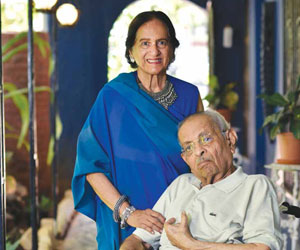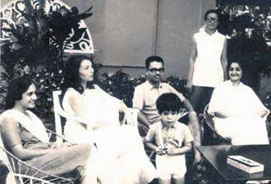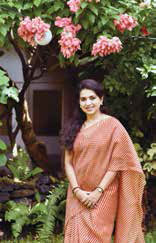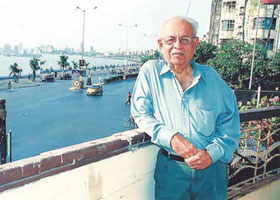We all know about Nana Chudasama, former Sheriff of Mumbai, by his pithy, in-your-face banners. But he, together with his wife Munira show how it is to be epitomes of the culture of humility, togetherness, love for people and joy for life, and how to live a life of wit and companionship...

Even before Twitter made its global appearance in 2006, social crusader and former Sheriff of Mumbai, Nana Chudasama was on ‘Twitter Mode’ through his historic banners across Mumbai. The banners, in a few words, presented (and continue to do so), the witty, sarcastic, and sometimes cool side of current events that were/are the talk of the town. Some of such banners that created a stir were: ‘IRONY: Majority of MPs crorepati; majority of people, poor.’ Or ‘Pen is mightier than the sword, Agitate, Debate but don’t vandalise.’ His mission continues. One of his latest ones was: ‘Demonetisation: You can dash, smash or crash, but still no cash.’
Fondly called Nana, he was twice elected Sheriff of Mumbai, during which his campaign for ‘I love Mumbai’ was a runaway success. As an Indian equivalent of international social organisations like Rotary Club, he founded Giants International, which is in active mode today with 500 branches in India and several branches across the world, including USA, UK, South Africa, Mauritius and Ukraine. Giants undertakes social projects like family welfare, disaster management, environment and education.
In his 80s, Nana’s mobility has reduced, but his keenness in what’s happening around him can be seen in the glint of his eyes. More importantly, the love and affection between his wife, Munira and him, is palpable. Life in the wheel chair has not been easy for Nana, but Munira makes him feel at ease. Also, that does not stop him from posing for photographs for us, with Munira, cajoling, propelling and affectionately asking him to pose — smilingly pushing him to look at the camera, like a young mother does with her kids. Nana’s enthusiasm manifests in his quick response to her requests as he looks into the camera and tries hard to keep his head on his shoulders. So, when and why is he confined to a wheelchair? Munira, with an air of positivity, brushes off saying, “Oh, it is just a result of not exercising. Otherwise all his faculties are perfectly healthy.” Nana stares in agreement. Knowing Nana, who loves to wax eloquent on any subject and possessed the gift of the gab to make a stranger his friend in an instant – it’s unbelievable that he is so quiet now. It is fondly said that no one loves Mumbai like Nana does. And as for his ‘banners’, Mukesh Ambani, during the book release of his compilation of banners and their relevance, had stated that Nana is indeed the original Twitteratti of the world.
Whether it’s the peon who comes to him or a Mukesh Ambani who visits him, he is the same to all of them. Everywhere we go, he keeps meeting people. He will meet the liftman and ask him how he is, as if he is an old pal of his - Munira Chudasama
Munira was born and brought up in a wealthy and educated Bohra family of the Jasdanvallas of Mumbai, which strongly believed in girls’ education. Munira is a double graduate, thanks to her forward-looking parents; worked as a banker and then carved a niche for herself in the world of fashion through her renowned boutique, ‘The Golden Thimble’. Their daughter, Shaina NC, the national spokesperson of the BJP carries on her mother’s legacy and has another frill to the glory through her designer sarees that are patronised by Bollywood stars too.
Says Munira proudly, “I joined a bank but my parents were very conservative when it came to daughters taking up a career. But someone convinced them, saying, what is the use of educating them and not letting them work? That’s how I worked for a short time in the bank and thereafter I opened ‘The Golden Thimble’ boutique which I ran for 35 years, without any formal education in fashion designing. Those were the lovely days.’’ She has now handed over the boutique to her daughter, Shaina.
My dad’s marriage to my mother was never a bed of roses, a Hindu divorcee marrying a Bohra Muslim during the late 1960s was extremely controversial, to say the least. But it is clearly Munira who has been his pillar of support for over 40 years. She was always there for him through thick and thin and did all the heavy lifting behind the scenes (Akshay, excerpt from the book (History on a Banner))

Munira, who recently celebrated her 80th birthday, is an epitome of elegance and charisma. Her affable nature and love for ethnic clothes and jewellery sets her in a class apart. Their love story is set in the backdrop of the 1960s when even in urban Mumbai, inter-religious marriages were taboo. Nana’s father was the erstwhile Police Commissioner of Mumbai while Munira’s father was a wealthy Bohra businessman.
How did they meet? Says Munira, who does all the talking, time and again looking at Nana to get his nod of approval, with a sweet smile, “I don’t remember, but we would often date in the cafes after we first met in 1966, though I can’t remember the date and venue of our first meeting. I come from a family of staunch Muslims, and a very large family — seven sisters and two brothers. I was the youngest of the lot and the only person to break the norm, marrying out of the community. Those days, no one eloped. We did so in 1969 and got secretly married.’’
Where did you marry then? Says Munira, “Here, in this house. The landlord was an old Parsi lady and she was a very lovely person. At that time, Nana was a bachelor and was looking out for a place to stay. Somebody introduced him to her but she was reluctant. Nana has his endearing ways, because of which everyone loves him. She said she would not give him a rent receipt; not permit him to make any changes in the house and would not spend a penny for any repair work. Nana agreed to all her terms. As she got to know him, she adored Nana because he is very human. She was a lady of tremendous intelligence who had seen the world. She single-handedly brought up her two differently abled sons.” Quips Shaina, “It was she who got my parents married.” The Chudasamas subsequently bought the house and have been residing there till today.
What is it that she loves about Nana? “Coming from a conservative family, I found him a totally different individual. I was not aware that there are other ways of living life, like being socially sensitive. More importantly, he is always good with everyone. Even his enemy becomes his absolute devotee, which is indeed remarkable. That’s because he does not fight with anybody. Another important thing that I learnt from him is the attitude towards money. For him, money has not been a concern. When he was young, he used to say, ‘I treat money with contempt; I can get it whenever I want.’ His friends used to say, because you have it, you are saying so’ He would say, ‘I don’t care even if it comes.’ When we built our house in Pune, I used to say ‘Nana, How will you do it?’ He said, ‘Don’t worry, it will happen’ and it really happened.’’
Did you face any opposition from your families? “No, his family was different. In stark contrast, my family was very staunchly conservative. My father wouldn’t speak to me at all after that. My mother, a gentle lady was very nice about it. Once, she went to my father and said, ‘You are not speaking but your daughter is missing you.’ He sternly said, ‘Tell her that I am alright and not to worry’.”

The other great quality of Nana, says Munira, is his silent support to her for her enterprise. She narrates, “After marriage, I started ‘The Golden Thimble’. Initially, I used to work in his office but he felt it would be better if I had my own business. He encouraged me a lot. I remember, when I had started the boutique, it was like a French Salon. It wasn’t like a proper boutique, with counters and all the other frills. The place belonged to Nana, otherwise investing in the place would have been way out my reach. It wasn’t doing well, naturally, because I was not qualified, and in those days one usually wasn’t advertising. I was worried, what if it doesn’t work? He said, ‘So if it doesn’t work, we will close it down.’ That has been his attitude. He doesn’t fret and fume about anything. Whether it’s the peon who comes to him or a Mukesh Ambani who visits him, he is the same to all of them. Everywhere we go, he keeps meeting people. He will meet the liftman and ask him how he is, as if he is an old pal of his. They feel so good.”
How did he start the Giants International? Says she proudly, “He was with the Lions and the Rotary. He said, ‘Why not an organisation in India and spread it worldwide?’ And you know at that time Lion’s and Rotary used to pay large amounts. I remember I used to get $20 when we travelled, oh gosh, I thought that was a great amount. Nana said, ‘Indians don’t have to be taught how to serve, it is in our blood, so let’s start an organisation from India, starting with a prayer, from the Upanishad.’ He always said to the members, ‘I don’t want cheques from anyone; I want you to give yourself to a cause. If you are having a blood donation give your blood first then take from others.’ So, Giants began with five to eight of his friends and now there are more than 500 groups all over the country. There are branches in other countries too. Conventions take place in different parts of the world, in Mauritius, London and all over.’’ Prior to that in 1963, Nana had revived the Jaycee movement in Mumbai and was its National President.’’
States the Giants International website, of Nana’s objective launching it: “After the search for food and shelter man yearns for recognition in the society he lives in. At a later stage, he seeks a manifestation/realisation of the mission of his life. There he doesn’t think of the material returns and works selflessly to pay back something to the society, which developed him to the present status. Helping the needy, serving to eradicate the suffering of the downtrodden becomes of prime importance to him. It’s here he feels Giants provide a universal platform where he can meet many, think on the common cause and transform that thinking to action.
Those to whom life has been kind should not accept this good fortune as a matter of course, but it’s one’s duty to think continually of those who have been denied this privilege.’’
How did his ‘I love Mumbai’ campaign trigger off? Says Munira proudly, “It (Mumbai Sheriff) is a 300 year old post and is a nominated one. The Governor and Chief Minister choose the individual. I remember Sharad Pawar was the CM at that time and had praised Nana’s work. As for the ‘I love Mumbai’ campaign, there was some opposition from some political leaders but Balasaheb Thackeray supported him whole-heartedly.’’

Nana Chudasama’s book, ‘History on a Banner’ is a compilation of his thought-provoking banners on Mumbai’s Marine Drive that caught the attention of thousands of commuters. It is an interesting chronicle of current events that shape our collective destinies.
Nana, who gifted me this book, autographed it stating, “Humour is the essence of life.’’ And that’s precisely the content of the book. Writes Mukesh Ambani, “…The essence of Nana Chudasama is his wit and humour and his courage in using it to point out aberrations in our political, economic and social life.’’
Writes Shobhaa De, “For years and years there have been just two significant voices that have accurately reflected the aspirations and angst, the hopes and frustrations of the ‘aam aadmi’ in Mumbai – R K Laxman’s and Nana Chudasama’s. Laxman’s pocket cartoons and Nana’s banners have spoken on behalf of the common man for decades.
Shaina NC, besides having made it successfully in politics and entrepreneurship, is the glamorous and dedicated daughter of her stalwart parents, Nana and Munira Chudasama. She gives a high score to her parents for having made her what she is today.
Says she, with great pride in her voice, “The greatest characteristic of my parents is that they are the same with all people, irrespective of their status. They have no air of arrogance in them or towards others. They have always displayed extreme tolerance and patience. This has made me value every person I come across. I learnt from them how important it is to spend time with family. Despite my parents being social activists and very busy, I remember as a child that they always had time for us. I initially resented that my mother was working, but later on I realised that it made me independent, and the importance of the value of making on your own.’’
“In those days my parents eloped and got married and it was a very big deal then for my mother to pick up the courage to have an interreligious marriage. She is the pillar of the house.’’ When Corporate Citizen approached Munira for an interview, the first thing she said was, “You must speak to Shaina as the father-daughter bond is so thick. I come later.’’
Writes Akshay of Nana as a father, “No matter what his accomplishments for society or for our city of Mumbai are, to me his greatest accomplishment is what he has done for my sisters Brinda, Shaina (popularly known as Shaina NC) and me as a father, and as grandfather to Aahana, Aashti, Wyoma, Shanaya and Aayan and as a father-in-law to Alfaz, Manish and Aparna. I cannot remember a single occasion when we have needed him and he has not been by our side, be it an opening for Brinda, assisting Shaina with her political career or attending my law graduation…Nana may not have been a great academician but his Herculean common sense has taught us the simple joys of life, the importance of humility and the virtue of giving rather than taking.’’

An article in the magazine, ‘Upper Crust’ aptly reflects how much of a family man Nana is. It states: “Nana Chudasama loves Bombay. And Bombay loves Nana. But one mistake Bombay and no Bombayite will ever make is to invite the former Sheriff out on a Sunday for one of those fashionable society champagne brunches that begin at 10 with a late breakfast and end at 5 over high tea. For Nana will just not accept such an invitation. It would almost amount to sacrilege. ‘Sunday is for family and home,’ he will say reluctantly but firmly, Cuban cigar in mouth, the hands gesturing helplessly. All of Bombay knows that Nana is a kind man and an accommodating man. The city and its citizens are uppermost on his mind. But not on a Sunday. He becomes a family man, then.’’
“…I also say, a responsible citizen should be accessible to his children and his children to him. My idea of chilling out on a Sunday is being around the family, playing with my dog Tandy, watching the sea, smoking a cigar, reading and watching TV,” he is quoted, saying.
Having been together for 48 years, what does she think about marriage? Says Munira, “It is all about give and take. Nowadays, they all want to take; no one wants to give. Even now, there are so many from even my generation who don’t care about their loved ones.’’
What are the important ingredients to keep a marriage? “You have to find out his or her plus points and take it from there; I don’t believe anyone who says my life is so lovely, from the beginning — all rubbish. You have to work hard towards your marriage. One thing Nana used to say, ‘I hate going for these 50th anniversary parties – from outside they are grand, and then the bedroom scene at home is fights and quarrels.’’’
So, what is your advice to the younger generation? “Times have changed; keep in mind the positive things; just keep your marriage going and just for the sake of old age, it is so important to have a spouse. At that age, you need somebody to fight with, get angry with. Do treasure simple moments like when your spouse says how you are feeling today or have you had your cup of tea today. Even that matters a lot.’’
Writes her son Akshay, a legal luminary, in Nana Chudasama’s book, ‘History on a Banner’, “My dad’s marriage to my mother was never a bed of roses, a Hindu divorcee marrying a Bohra Muslim during the late 1960s was extremely controversial, to say the least. But it is clearly Munira who has been his pillar of support for over 40 years. She was always there for him through thick and thin and did all the heavy lifting behind the scenes.’’
“We did not choose elite schools for our children as we wanted them to grow up as normal human beings. They went by school bus. This made them independent and very strong, internally. Life is too fast now and it is difficult to cope up. In the hurry to race fast, there is no time for values. I am not against technology but too much of it is ruining the minds of young children. Everyone is obsessed with wealth — now wealth has become the absolute thing to gauge someone’s worth, which is so disgusting.”
So what is the hope? What do you think of the future? Says Munira, “I still feel that the handful which are there, have to keep the fight on; you don’t give up or just become a recluse and say ‘there is nobody is like me so what is the point of conversation.’ I feel that the fight should be there all the time. I read something very nice the other day; it said, ‘It took me an entire life to create a living but after that I did not know how to live’. You create and create and then forget what life is.’’

What is the philosophy of life that she lives by? Says she, “I am obsessed with truth and obsessed about being straight in life. I am very obsessed about doing Vipassana too and I am happy when I came back after doing it. However, when I used to come back, Nana would say, ‘Munni you have become very intolerant after Vipassana.’ My kids used to also say the same. I took it positively, they mean well for me and there is no ulterior motive to push me down. I always introspect a lot, you know, because I was so obsessed with truth, and I felt that I was not able to tolerate the lies in people. Nana would say, ‘don’t go beyond and get angry with somebody.’”
What is her secret of keeping fit and elegant? Sharing her beauty secrets, Munira says, “I started dyeing my hair now. I do my exercises and do not use cosmetics on my skin. If I have eaten too much, then I skip my next meal. I never go on a fastidious diet. As for Nana, he was the best tennis player of his family. He was very active, he never overate and he never drank. He was a constant cigar smoker. Since five years, he is not keeping well.”
Whatever people may say, this country is a secular country and I have great faith in secularism. No one has tabooed me because I married a Muslim. This is the inherent strength of this country. Any nation that calls itself secular must encourage intercommunity marriages (excerpt from an interview in Communalism Combat)
Dolly Thakore, the noted media person who had interviewed Nana and Munira had stated in her article on ‘Communalism Combat’, “The silver lining to this problem is that some brave individuals have taken life into their own hands, defied society and proved that barriers of religion, caste, and nationality do not jeopardise their happiness. A good example of this is our twice over sheriff of Mumbai, Nana Chudasama, a hugely successful public figure who continues to fight for causes, be it the environment or AIDS.’’
Munira had stated in the interview: “Sadly, religion is of prime importance in society. In filling up school forms and applications for my children, I always left a blank where it asked for religion. I left it for my children to choose what they want when they began to understand such things.” She never imposed Islam or Hinduism on them. They had a Christian maid for 30 years and many Sunday mornings saw Shaina accompanying her to the Church. Munira believes that in any relationship if either person is a fanatic about his or her religion it never works. “There are three dominating factors in a relationship faith, food, and festivals,’’ she says.
Nana, on a determined note told Dolly Thakore: “Whatever people may say, this country is a secular country and I have great faith in secularism. No one has tabooed me because I married a Muslim. This is the inherent strength of this country. Any nation that calls itself secular must encourage intercommunity marriages. My parents would have liked me to marry not only a Hindu but someone from one’s own community. But even my first wife was a Patel. I have always had opposition. But I went by what I felt was right.”
Indeed, Nana and Munira represent the culture of humility, togetherness, love for people and joy for life – ingredients that are largely missing today, in the race for keeping up with technology and making money one’s goal.
By Vinita Deshmukh